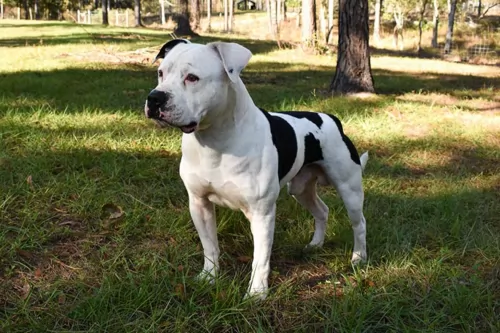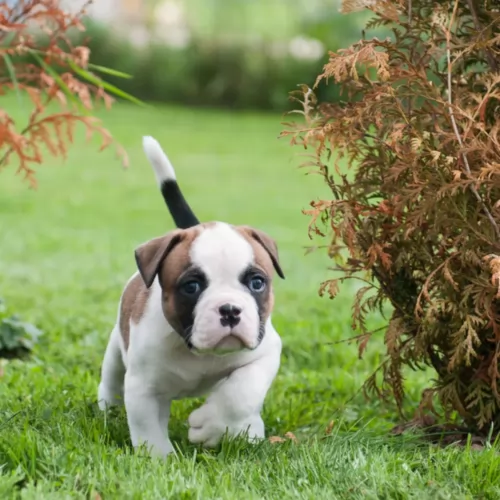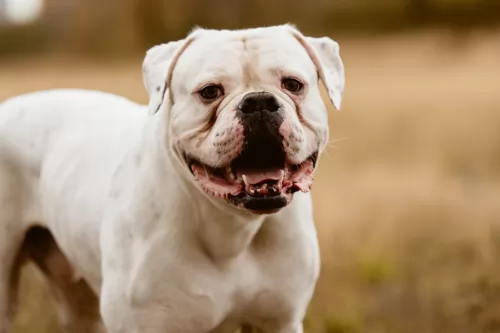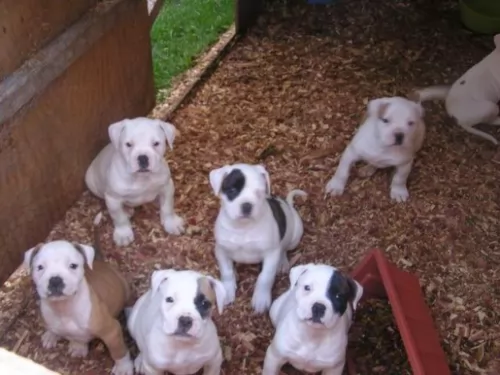 Petzlover
PetzloverAmerican Bulldog is originated from United States but Pugnaces Britanniae is originated from United Kingdom. Both American Bulldog and Pugnaces Britanniae are having almost same height. American Bulldog may weigh 56 kg / 123 pounds lesser than Pugnaces Britanniae. Both American Bulldog and Pugnaces Britanniae has almost same life span. American Bulldog may have less litter size than Pugnaces Britanniae. Both American Bulldog and Pugnaces Britanniae requires Low Maintenance.
 Following World War II, the American Bulldog was almost extinct.
Following World War II, the American Bulldog was almost extinct.
Thanks to John D. Johnson from Summerville, Georgia the breed is still with us today. He gathered the best dogs he could find throughout the rural South and bred them back into popularity among his family and other rural families. His father bred the American Bulldog before John did and they have bred them longer than any other in any part of the world. His dogs were regularly used for tracking, hunting, guarding, watchdog and weight pulling. At some point Alan Scott joined Johnson breeding other bulldogs to Johnson's and forming the Standard American Bulldog.
The American Bulldog/ is popular today as a family pet and companion as well as a working dog.
Pugnaces Britanniae is a dog which is now extinct. There isn't certainty surrounding the origins of the dog but it is thought they descended from dogs brought to Britain way back in the 6th century BC already.
These are ancient dogs, and when you do research you find references dating back to centuries ago. In fact when you read of the Roman conquest of Britain you read of huge dogs, which the Romans referred to as Pugnaces Britanniae.
It is believed that the English Mastiff descended from the ancient Alaunt and Pugnaces Britanniae and that the dog was used as a war dog.
 The American Bulldog is a powerful and muscular dog in a sturdy and compact frame. The female is more refined than the heavy boned and stocky male, but both genders are athletic, agile and quick. The have large heads, strong jaws, a muscular neck and with a moderately deep and wide chest.
The American Bulldog is a powerful and muscular dog in a sturdy and compact frame. The female is more refined than the heavy boned and stocky male, but both genders are athletic, agile and quick. The have large heads, strong jaws, a muscular neck and with a moderately deep and wide chest.
They have a square head, with muscular cheeks and a clearly defined furrow between his eyes. With broad, square and strong muzzles, they have a reverse scissors, scissors, moderate underbite and an even bite. Ears come in a variety of shapes and sizes and eyes can be any color as well. The nose however should be black and lips black as well. Their legs are strong, heavy boned and straight with well-defined muscles in the hindquarters. Finally ,they have a thick, low set tail that comes to a point at the end.
The Pugnaces Britanniae was a huge dog standing at roughly 67 to 75cm and weighing 52 to 110kg.
He was a heavily built dog, a Mastiff type dog that had a large head, broad muzzle with fairly loose skin around the mouth, brown eyes, a broad back and rump, muscular legs and floppy ears with a long tail. In fact the Mastiff, thought to have descended from the ancient Alaunt and Pugnaces Britanniae, gives you an idea of what the dog looked like. He no doubt has a short, smooth coat available in fawn, tan or brindle and with the black mask.
The Pugnaces Britannia was a naturally aggressive dog so it is to be expected that he wouldn’t automatically have been a good family dog, possibly being aggressive around children and other dogs. They were intelligent and were no doubt taught some simple commands.
They were also very territorial dogs, wanting to instinctively chase and attack unknown people and animals. They were strong minded, confident, loyal ad loving dogs towards their owners, being protective of them, wanting to please them.
 The American Bulldog is characteristically loyal, brave and reliable. It is a friendly, gentle dog that truly loves children. There is not a hostile bone in his body despite his history and reputation for bull baiting. Though he is protective of its family and affectionate with most, he still needs a human companion who is strong willed and a genuine pack leader. Without this he might become aggressive around other dogs and pets. They are immensely self-confident and they do slobber and drool and will become excited and hard to handle without daily exercise of both their body and their minds.
The American Bulldog is characteristically loyal, brave and reliable. It is a friendly, gentle dog that truly loves children. There is not a hostile bone in his body despite his history and reputation for bull baiting. Though he is protective of its family and affectionate with most, he still needs a human companion who is strong willed and a genuine pack leader. Without this he might become aggressive around other dogs and pets. They are immensely self-confident and they do slobber and drool and will become excited and hard to handle without daily exercise of both their body and their minds.
The Pugnaces Britanniae may well have been a large dog and quite imposing to look at but he was in all likelihood a good-natured pet who got on well with his family members, being loyal and loving if brought up correctly.
Long ago dog training and socialization didn’t exist but a large dog like this would have to be socialized and trained to become obedient and an amicable all-rounder.
 Though generally healthy, the American Bulldog is prone to a few problems.
Though generally healthy, the American Bulldog is prone to a few problems.
This is a serious issue in many breeds of dogs and is especially prevalent with the American Bull Dog. This may seem ironic in such a short legged dog but it is unfortunately very common. It is a genetic disorder that causes the bones in the joint to separate and causes the dog much pain and lameness.
Due to skin folds you need to be care and watch for irritation and infection in the folds. They are also prone to ear infections.
The American Bulldog is prone to overeating and all the health issues that presents. With short legs and a genetic predisposition to arthritis and hip dysplasia, obesity is a real health risk for your bulldog.
The Pugnaces Britanniae could live to 10, 11 or 12 years of age with good care. Large Mastiff type dogs like this would have had to watch out for common canine diseases such as hip dysplasia, cancer and bloat.
In those days, no screening tests were available for health problems like this. Gastric dilatation volvulus or bloat is a common health issue with large, deep chested dogs where the stomach fills with gas and the stomach twists. Its a life threatening disease.
Canine heart disease is another serious health issue with these mastiff type dogs. Early stages with heart disease show there may well be no symptoms at all. However, as the heart disease progresses towards congestive heart failure, the dog will have symptoms such as fatigue, difficulty with breathing, weight loss, a distended abdomen and coughing.
A dog with symptoms like this would have to see a vet immediately.
The diets of ancient dogs were different to what they are today, as in those days there were no commercially manufactured dog foods. Dog owners in all likelihood tossed scraps to them which included starch.
Today a large dog such as the extinct Pugnaces Britannia would have no doubt been fed a high quality kibble from a leading brand and packed with minerals and vitamins specially formulated for a large dog breed.
Homemade food is also important, but not any kind of food – it has to be food which doesn’t upset the dog’s digestive system. Simple but nutritious food such as boiled chicken, brown rice or pasta, sweet potatoes, carrots and spinach is ideal for a dog, and when it is chopped up can be added twice a week to the dry kibble for a tasty, healthy treat.
Raw meat added in occasionally is also hugely beneficial. No dog should ever be without fresh, cool water constantly available.
As a short haired dog, the Pugnaces Britanniae would have required a brushing twice a week to rid the dog of loose hairs. Maybe in those days they didn’t check their dogs over to see that all was well, but today you would need to check the inside of the ears. If the insides were red, it could be a sign of an ear infection brought on by dampness, excess wax and dirt.
The eyes would need to be checked for discharge and the teeth checked a well. One rotten tooth can cause a lot of havoc. The nails of the dog would have had to be checked and clipped as well.
As a war dog, the Pugnaces Britanniae would have been fit. He is a big dog and while they require exercise such as walks and hide-and-seek type of games, he isn’t the kind of dog that would go running with you on a jog, as large, heavy dogs can overheat easily.